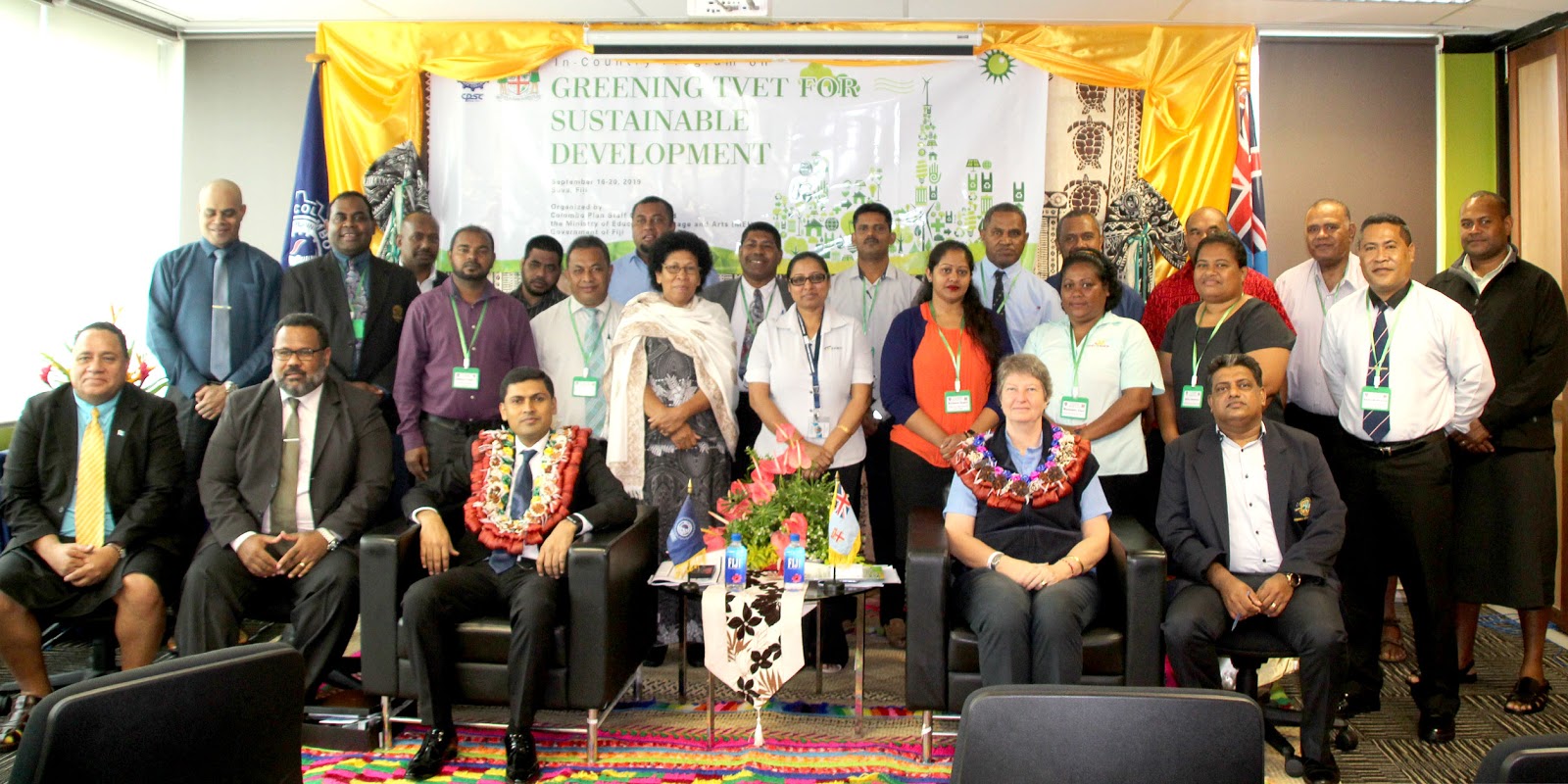
Greening TVET is one of the key areas identified to develop human resources and TVET has to respond and acquire a modern strategic mindset in meeting the future at the forefront of global challenges. There is a need to impart strategies to incorporate the concepts and strategies for greening TVET, in addition to existing strategies on interdisciplinary teaching, research and innovation.
 Engr. Abdul Ghani Rajput (standing) facilitating the OnCOurse registration of the participants Thus is the motivation to organize this year’s in-country program in Fiji held from September 16-20, 2019 at the FCRS Conference Room in Suva. It was participated by 26 officials from Fiji’s vocational education sector.
Engr. Abdul Ghani Rajput (standing) facilitating the OnCOurse registration of the participants Thus is the motivation to organize this year’s in-country program in Fiji held from September 16-20, 2019 at the FCRS Conference Room in Suva. It was participated by 26 officials from Fiji’s vocational education sector.
In addition, two participants from the Republic of Marshall Islands attended the program as part of their arrangements with CPSC and their Fijian counterparts.
The program was organized in lieu with the move towards a “green economy” in parallel with the international debate and negotiations on climate change in order to achieve sustainable development. In order to achieve this, topics such as these are tackled: (1) concepts, elements and importance of greening TVET; (2) five pillars and strategies of greening TVET; (3) international practices and innovative initiatives in greening TVET; (4) integrating green competencies in the TVET curricula and (5) practices of greening TVET in the context of Fiji.
The five-day event was jointly supervised by CPSC and the Ministry of Education, Heritage and Arts led by the Director General, Dr. Ramhari Lamichhane and the Permanent Secretary, Ms. Alison Burchell, respectively. Program coordination was handled by Engr. Abdul Ghani Rajput, CPSC Faculty Specialist. He was supported locally by Mr. Ranjish Raj, Manager of Learning and Development for Human Resources, Ministry of Education, Heritage and Arts. Discussions in the local context, meanwhile, was facilitated by Mr. Pita Waqawai, Professional Officer at the National Qualifications Implementation Unit, Fiji Higher Education Commission.
 Participants during the group tasks
Participants during the group tasks Engr. Rajput (standing, left) with Mr. Pita Waqawai from the Fiji Higher Education Commission (standing, right) addressing queries from the participants.
Engr. Rajput (standing, left) with Mr. Pita Waqawai from the Fiji Higher Education Commission (standing, right) addressing queries from the participants.To further incorporate actual greening TVET practices with the classroom lectures, a study visit to the Montfort Boys Town Suva, located in Lami, Central Fiji was organized. The vocational school focuses on offering free technical courses such as automotive technology, electrical technology, woodworking, and other relevant life skill courses to out-of-school youths and disadvantaged teenagers.
The program was well-appreciated by the participants and they cited that it is very informative and knowledgeable. They are also looking forward to implement the key lessons imparted by the program particularly the greening concepts and the five pillars of greening TVET.
National Seminar on Transforming TVET for Sustainable Development
 Speakers of the National Seminar (seated) during the session
Speakers of the National Seminar (seated) during the session
A one-day national seminar was organized during the 5-day in-country program in order to spread the program’s lessons to more participants and to provide a venue to tackle relevant issues particularly the transformation of TVET for sustainable development. This event was attended by 24 officials and participants and was held in Suva on September 19, 2019.
The seminar’s aims are to: (1) Provide insights for policy makers, TVET providers and educationists on promoting skills for sustainability future trends and developments in the TVET segment; (2) Identify and examine issues, challenges in addressing skills development for sustainability; and (3) Elucidate different strategies and approaches towards successful diffusion of skills for sustainability within the TVET system.
Topics such as the importance of sustainable development in TVET towards sustainable economies, innovative strategies for developing skills for sustainability in Fiji and promoting generic skills for sustainable employability were tackled by the invited speakers namely: Mr. Abdul Ghani Rajput (Program Coordinator of ICP Fiji), Dr. Isimeli Waibuta Tagicakiverata (Director of National Productivity Training Centre) and Mr. Gareth McGrath (Director of the Australia-Pacific Training Coalition), respectively. An open forum also ensued after the discussions to directly address the concerns of the participants.
 During the study visit to Montfort Boys Town in Lamu, Central Fiji
During the study visit to Montfort Boys Town in Lamu, Central Fiji








